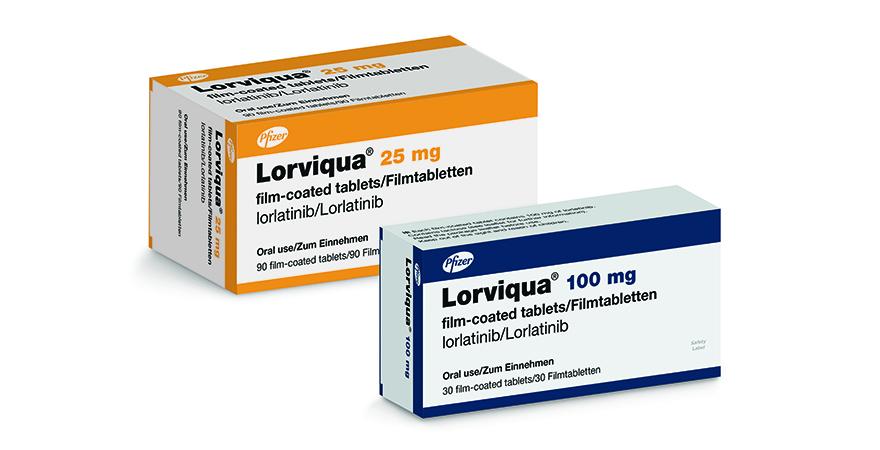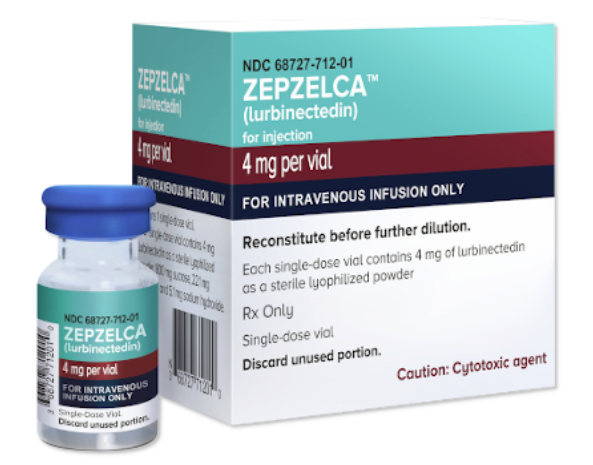Lorviqua (lorlatinib) vs Zepzelca (lurbinectedin)
Lorviqua (lorlatinib) vs Zepzelca (lurbinectedin)
Lorviqua (lorlatinib) is a targeted therapy known as an ALK tyrosine kinase inhibitor, primarily used for the treatment of ALK-positive non-small cell lung cancer (NSCLC) in patients who have progressed on other ALK inhibitors. Zepzelca (lurbinectedin) is a different type of chemotherapy that works by inhibiting transcription and inducing DNA breaks, and it is used for the treatment of metastatic small cell lung cancer (SCLC) after prior platinum-based chemotherapy. When deciding between these two medications, it is crucial to consider the specific type of lung cancer diagnosed and previous treatments, as each drug is tailored to different subtypes and stages of lung cancer, with Lorviqua being specific for ALK-positive NSCLC and Zepzelca for SCLC.
Difference between Lorviqua and Zepzelca
| Metric | Lorviqua (lorlatinib) | Zepzelca (lurbinectedin) |
|---|---|---|
| Generic name | lorlatinib | lurbinectedin |
| Indications | ALK-positive metastatic non-small cell lung cancer (NSCLC) | Metastatic small cell lung cancer (SCLC) |
| Mechanism of action | ALK and ROS1 tyrosine kinase inhibitor | Trabectedin analogue that binds to the minor groove of DNA, inhibiting transcription |
| Brand names | Lorviqua | Zepzelca |
| Administrative route | Oral | Intravenous |
| Side effects | Hypercholesterolemia, hypertriglyceridemia, edema, weight gain, neuropathy | Myelosuppression, fatigue, increased liver enzymes, nausea, decreased appetite |
| Contraindications | Hypersensitivity to lorlatinib | Hypersensitivity to lurbinectedin or any component of the formulation |
| Drug class | Tyrosine kinase inhibitor | Alkylating drug |
| Manufacturer | Pfizer | Pharma Mar |
Efficacy
Lorviqua (lorlatinib) Efficacy in Lung Cancer
Lorviqua, known by its generic name lorlatinib, is a medication specifically designed to treat certain types of lung cancer. It is particularly effective in non-small cell lung cancer (NSCLC) that is anaplastic lymphoma kinase (ALK)-positive. Lorlatinib is a third-generation ALK inhibitor that has shown significant efficacy in patients who have progressed on earlier-generation ALK inhibitors such as crizotinib, ceritinib, or alectinib. Clinical trials have demonstrated that lorlatinib has substantial activity against both brain metastases and systemic disease, which is a critical consideration in lung cancer treatment.
Studies have shown that lorlatinib is effective in treating patients with ALK-positive metastatic NSCLC who have either not responded to prior therapies or whose cancer has continued to progress. The response rates to lorlatinib in this patient population are notable, with a considerable proportion of patients experiencing tumor shrinkage. This efficacy is also observed in patients with central nervous system involvement, which is a common complication in advanced NSCLC. The ability of lorlatinib to cross the blood-brain barrier and act on brain metastases offers a significant therapeutic advantage.
Zepzelca (lurbinectedin) Efficacy in Lung Cancer
Zepzelca, with the generic name lurbinectedin, is another medication used in the treatment of lung cancer, specifically small cell lung cancer (SCLC). Lurbinectedin is a selective inhibitor of oncogenic transcription and has shown promising results in the treatment of SCLC, particularly in patients with disease relapse after prior platinum-containing therapy. In clinical trials, lurbinectedin has demonstrated a meaningful reduction in tumor size and a manageable safety profile, making it a valuable option for patients with limited treatment choices.
The efficacy of Zepzelca in the second-line setting for SCLC is supported by data showing an overall response rate that is encouraging for a disease that is notoriously difficult to treat after relapse. The duration of response and progression-free survival with lurbinectedin treatment have also contributed to its reputation as an effective agent for SCLC. As with many cancer therapies, the efficacy of Zepzelca can vary based on individual patient factors, but it remains an important part of the therapeutic arsenal against small cell lung cancer.
Regulatory Agency Approvals
Lorviqua
-
European Medical Agency (EMA), European Union

-
Food and Drug Administration (FDA), USA

-
Health Canada

-
Therapeutic Goods Administration (TGA), Australia

Zepzelca
-
Food and Drug Administration (FDA), USA

Access Lorviqua or Zepzelca today
If Lorviqua or Zepzelca are not approved or available in your country (e.g. due to supply issues), you can access them via Everyone.org.
How it works

Make an enquiry
Choose the medicine you want to buy, answer a couple of questions, and upload your prescription to speed things up. We’ll get back to you within 24 hours.


Make an enquiry
Choose the medicine you want to buy, answer a couple of questions, and upload your prescription to speed things up. We’ll get back to you within 24 hours.


Breeze through the paperwork
We'll guide you through the required documents for importing unapproved medicine, ensuring you have all the necessary information.


Get a personalized quote
We’ll prepare a quote for you, including medicine costs and any shipping, administrative, or import fees that may apply.


Receive your medicine
Accept the quote and we’ll handle the rest - sourcing and safely delivering your medicine.

Some text on this page has been automatically generated. Speak to your physician before you start a new treatment or medication.
Let's talk
If you have any questions, call us or send us a message through WhatsApp or email:
Contact us




